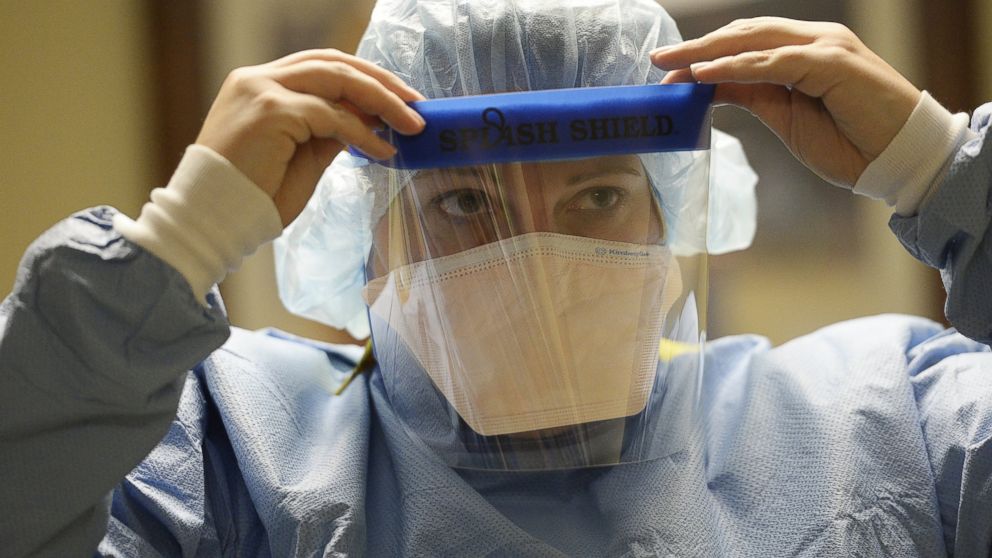Ebola Is Officially the October Surprise of The 2014 Election
Ebola emerges as an unexpected campaign issue in final month of 2014 midterms.

— -- In the 2012 campaign, the October surprise was Hurricane Sandy. This year, it’s Ebola.
With less than three weeks before the midterm election, Ebola has emerged front and center in stump speeches, on the debate stage and even some campaign ads as it’s turning into one of this election’s most unexpected, yet hottest campaign issues.
An ABC News/Washington Post poll released this week found that 65% of Americans are concerned about an Ebola epidemic, and four in ten Americans are worried they or an immediate family member might catch the disease. Figures like these could give campaigns an indication that the Ebola issue might resonate with voters this November.
Republican Senate candidates have seen an opening to criticize the administration for what they perceive is a poor response to Ebola. GOP Candidates in some of this year’s most important Senate races are calling on President Obama to place restrictions on travelers coming from the West African countries experiencing an Ebola outbreak, a step 67% of Americans support.
Two Democratic Senate candidates – Michelle Nunn in Georgia and Kay Hagan in North Carolina – have joined their Republican opponents (David Perdue and Thom Tillis, respectively) in calling for the travel ban.
Some Republican candidates, like Sen. Pat Roberts, R-Kansas, and Scott Brown in New Hampshire, have tied Ebola to border issues, arguing that a porous border allows for people with Ebola to come into the country.
For the most part, Democrats have refrained from calling for travel restrictions, instead focusing their attention on blaming Republicans for budget cuts to programs that could deal with Ebola. Earlier this week, The Agenda Project, a pro-Democrat non-profit group, released an ad titled “Republican Cuts Kill,” blaming GOP lawmakers for funding cuts for programs and agencies that would help in the Ebola response.
Sen. Mark Pryor, D-Ark., was the first candidate to make Ebola a political issue in a campaign ad, running a TV spot in August tying one of his opponent’s votes to pandemic outbreaks like Ebola.
The Ebola cases in the U.S. have prompted changes in lawmakers' schedules. President Obama cancelled two days of out-of-town events to hold meetings at the White House on Ebola, and Texas Gov. Rick Perry, who is mulling a run for the White House in 2016, even shortened an economic development trip to Europe in order to return to Texas. Two Senate candidates – Reps. Bruce Braley, D-Iowa, and Cory Gardner, R-Colo., - took a break from campaign activities on Thursday to attend a House hearing on Ebola, where they had an opportunity to grill CDC Director Thomas Frieden on the administration’s Ebola response.
Ebola is also becoming an issue in debates. With news of a second Ebola diagnoses in Texas dominating headlines Wednesday, Sen. Mark Udall, D-Colo,. and his Republican challenger Gardner, were asked about Ebola for the first time in a debate setting on Wednesday night.
"We ought to listen to the doctors and the health-care professionals…If they believe we ought to close our borders, we ought to restrict flights to and from West Africa. Let's listen to them,” Udall said, according to the Denver Post. “But senators and congressmen shouldn't be making those decisions. We should be supporting the resources that are necessary to meet the Ebola challenge."
"If the president's not willing to put into a place a travel ban, then we should have 100 percent screening of the people who are coming from those affected areas," Gardner said, according to the Denver Post.
Candidates are also facing questions about Ebola from reporters, as seen in this MSNBC interview with Pryor, where he struggled to answer whether the Obama administration had properly handled the response to Ebola.
But is Ebola a legitimate campaign issue or are campaigns engaging in fear mongering? Steven Greene, a professor of political science at NC State University, says it’s a little bit of both.
“I think there are very important issues of public policies related to Ebola that we should have a mature discussion about, but the truth is we don’t have mature discussion about anything in the campaign season so whatever political discussion about this is most likely going to be fear mongering,” Greene said.